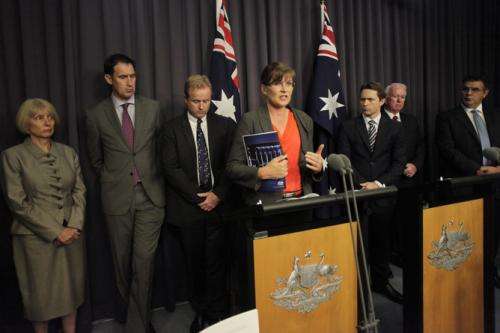Australian crime commission reveals illicit substance abuse in sport

The use of banned performance enhancing substances and illicit drugs is widespread in Australian sport and sometimes supported by coaches and scientists, according to a new report released by the Australian Crime Commission today.
The commission's chief, John Lawler said he is hopeful that the investigation will result in criminal charges.
The commission's 12 month inquiry found that organised crime syndicates are involved in the distribution of Performance and Image Enhancing Drugs (PIEDs).
"Despite being prohibited substances in professional sport, peptides and hormones are being used by professional athletes in Australia, facilitated by sports scientists, high performance coaches and sports staff. Widespread use of these substances has been identified, or is suspected by the ACC, in a number of professional sporting codes in Australia," the report said.
"In addition, the level of use of illicit drugs within some sporting codes is considered to be significantly higher than is recorded in official statistics."
Because investigations are ongoing, the report did not identify the clubs or players who stand accused of doping, but said that "officials from a club have been identified as administering, via injections and intravenous drips, a variety of substances, possibly including peptides."
Overseas experience had showed that the involvement of organised crime in sport may lead to match fixing, the report said.
David Rowe, Professor of Cultural Research at University of Western Sydney, said he was not surprised by the report's findings.
"The thing I am interested in is the intermeshing of the sport and gambling industries," he said.
"The more involvement you have [of sport and gambling], the greater the temptation to try and change the odds."
At stake was not just the professional integrity in sport but also a significant amount of public money, he said.
"At local, state and federal government levels, there is a significant amount of [financial] support for sport," he said, adding that public money was also spent on bidding for and hosting events like football's Asia Cup, which will be held in Australia in 2015.
Players and crime figures could conspire to fix the whole game or just minor parts of a match, such as when a goal is scored, he said.
"The gambling industry is already weighted against the gambler in all forms and if the match is fixed, then you have no chance unless you accidentally win or you are part of the fix," he said.
"The majority of gamblers are going to lose under those circumstances."
Professor Rowe said the report came at a "really important time for sport."
"We have an obligation to make sure we treat it very seriously and respond accordingly," he said.
The report said the problem crossed several codes and that two major codes had been briefed on it's findings and asked to respond.
Dr Mike Pottenger, a lecturer in Statistics and Political Economy at the University of Melbourne and an expert in organised crime pointed to a section of the report that warned that "if left unchecked, it is likely that organised criminals will increase their presence in the distribution of peptides and hormones in Australia."
"The initial concern is not just that the distribution of peptides will increase, but also that other organised criminal activity will grow and expand as a result," he said.
"It's often the case that organised crime will use those established networks to traffic other prohibited substances, like hard narcotics or weapons, particularly if and when those established networks are lucrative."
All Australians, not just those who follow sport, have an interest in addressing this issue, said Dr Pottenger.
"The other problem is that wherever organised crime exists, it involves corruption of public officials."
Dr Bob Stewart, Associate Professor in the School of Sport and Exercise Science at Victoria University said it was important to keep the report in perspective.
"Initially, I thought this is a bombshell but on reflection, I think it's not as serious as it first appears. Some of these issues have already been identified before and the peptide issue has been around for a while," he said.
"But the widespread use has been exposed in this report."
Associate Professor Stewart said it was important to separate out the issue of match fixing by criminal gangs and supply of illicit substances by criminal gangs.
"I don't think the gangs have infiltrated the clubs structures. I think the gangs may have influenced some club officials and one or two sports scientists but that's about all."
This story is published courtesy of The Conversation (under Creative Commons-Attribution/No derivatives).

















